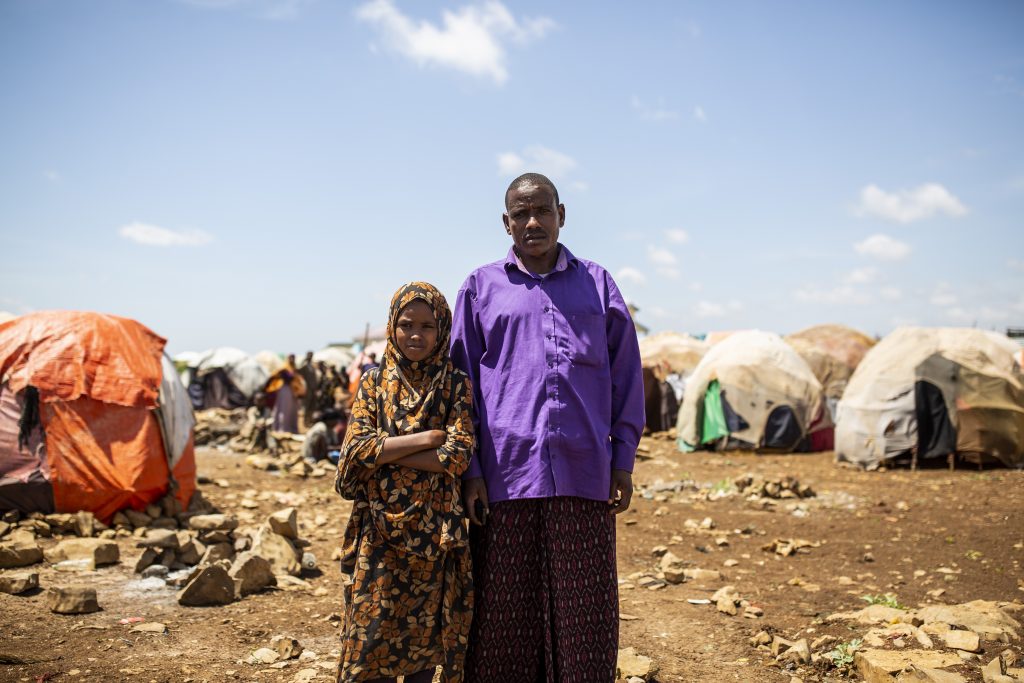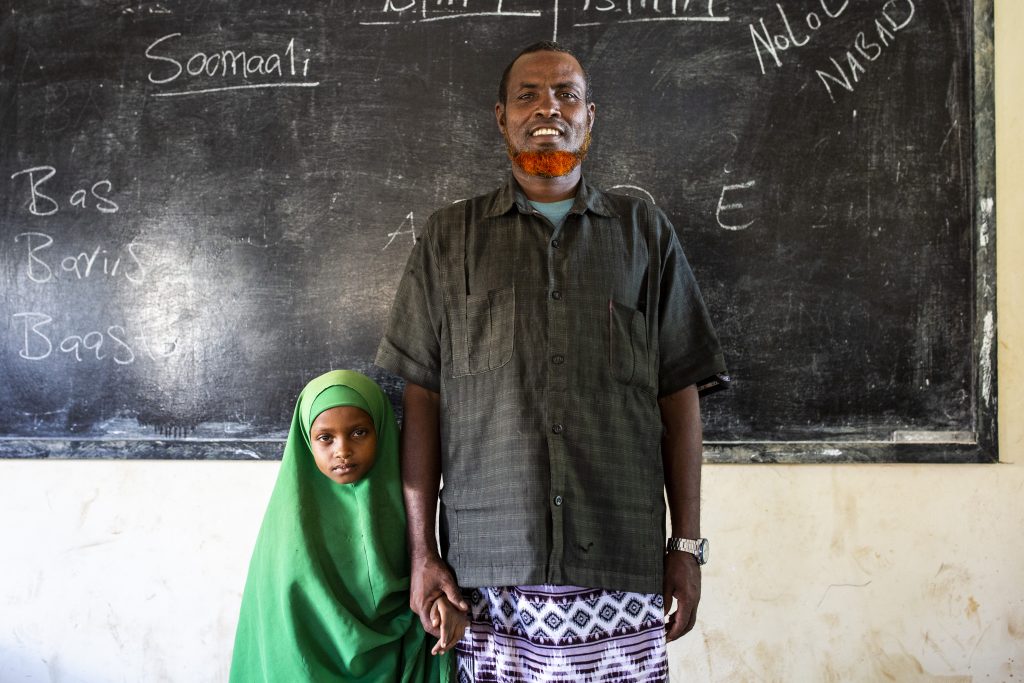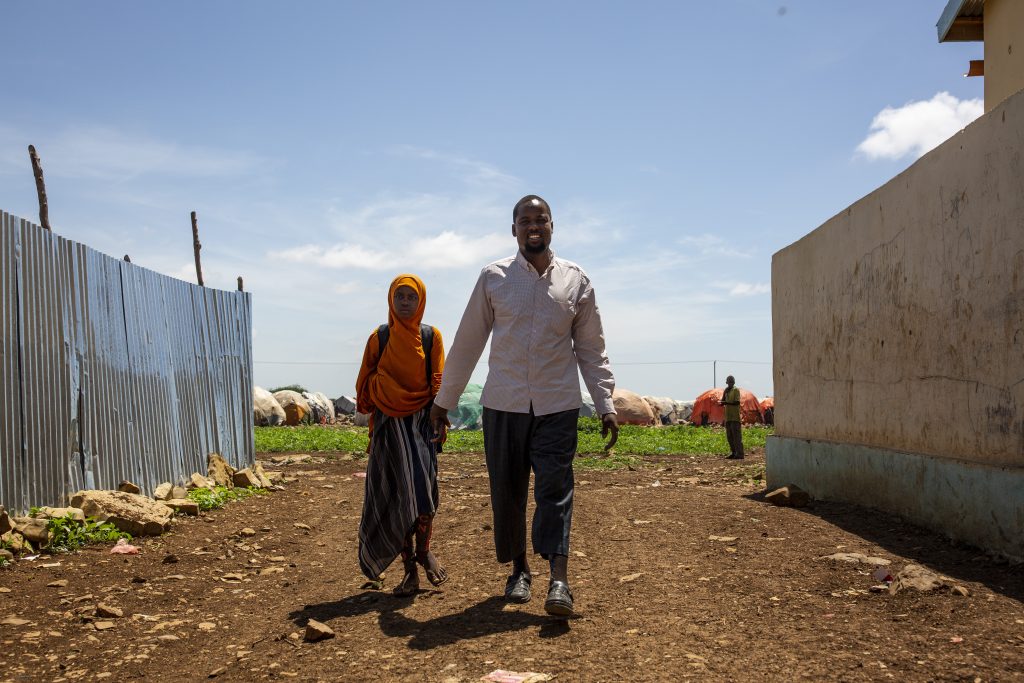Education for girls vital in the face of climate change
In Somalia, climate change has cost many their livelihoods. Without education, finding new paths in life is difficult for former nomads, and many of them now consider education as the way forward. Three fathers tell us why they want particularly their daughters to go to school.
Background
Finn Church Aid has supported six schools for internally displaced people (IDPs) in Baidoa. With support by the Ministry for Foreign Affairs Finland, the project has benefited 4,412 learners, including 228 children with disabilities.
There is an enormous demand for quality education in the IDP camps. The number of areas inhabited by IDPs rose from 70 in 2017 to 517 by August 2020.
The children in this article are in Mustaqbal Integrated School, built with the support of the Ministry for Foreign Affairs Finland in 2018. It is currently the only school in Baidoa where children with disabilities can learn in the same school with other children, and be assisted by teachers trained in special needs education.
The situation is direst in areas where the influence of the extremist group al-Shabaab is strongest and education opportunities have traditionally been weak. The lack of options leads to a battle for survival where joining the group may feel like the only choice.
Somalia is balancing on the brink of famine, and parents often try to save their families by moving to cities. Baidoa is the second-largest hub for internally displaced people (IDPs) after the capital Mogadishu – the 392,274 IDPs almost outnumber the local population.
The number of IDPs has increased dramatically since the drought of 2017, and the conditions in the camp are difficult. Without a livelihood, starting a new life is a challenge.
Like many other countries, Somalia closed its schools in the spring to prevent the spread of the coronavirus, but the children returned to school in August. Fathers who have lost their crops and cattle tell us what they want for their children’s future.

Abdibakir Abdinur Aden, 38, with his daughter Falhado, 11.
“My daughter teaches me things”
Abdibakir Abdinur Aden, 38. Single father of five.
“The drought made us choose between flight and death. We did not have anything to eat or drink, which made us flee from our village to Baidoa two and a half years ago.
In Somalia, our greatest challenge is the harsh weather. First, the drought took our livelihoods. Our cattle died, and our crops perished. Today, we heard in the news that our village is under floodwater. I am glad we left.
Arriving in Baidoa opened my eyes. It is much easier for educated people to sustain themselves even though we all suffer from the changes in the weather. They can adapt to new situations. They will always find a job because they can read and write, and they can start businesses.
I could not go to school. Education was not valued in my village, and my generation only knows about farming and cattle. I cannot take care of my family on my own after losing my crops because I was never allowed to go to school and learn other things.
The life in the IDP camp is challenging. We have no electricity. There is a shortage of water and medical care. But we do have a school, and I think that is a great relief. Earlier, the children played on the street, and the street is not a safe place for growing up. Extremist groups recruit young people with nothing to do.
My children have been to school for a couple of months, and I see a significant difference. Their life has a purpose. They feel secure, they have friends at school, and they have also learned discipline.
People yearn for a better future for their children. I think it is particularly important for girls to go to school because women change communities and break stereotypes. I learned everything from my mother. Women create the atmosphere at home, and that is why it is obvious that education is for girls and boys equally.
My daughter Faldaho is 11 years old and in the second grade. I learn things myself, and I am very proud of her.
When my children graduate, I am sure that they can take care of themselves and their families. They can support their communities and the development of Somalia.
My paradise is where I see my daughter making it on her own in the world.”

Abdullahi Hassan Yusuf, 53, with his daughter Luuley.
“Everyone benefits from the girls going to school”
Abdullahi Hassan Yusuf, 53. Father of seven.
“The school has changed our lives in Baidoa. After a few months in school, our children can already read and write. They can focus better, and life is more balanced.
I believe that education will open many opportunities for them, especially for the girls. I grew crops and had cattle before we lost everything because of the drought and the war. We had nothing when we arrived in Baidoa.
My daughter Luuley has a hearing disability but now she can go to school because the teachers have been trained to teach children with special needs (in Mustaqbal Integrated School). I am happy for her. Luuley likes especially English and mathematics. She has found friends in the class for children with hearing disabilities, and they play together often, for example skipping.
The new friends only make it more important to go to school. The school also eases the burden on parents because our lives here are full of challenges.
The head teacher of the school says Luuley is quick to learn. She has been to school for four months and she can already manage even the most difficult tasks. She has a good vocabulary in English.
What makes it difficult for our children to attend school is that there is not enough room for everyone. We need more schools.
Any community will benefit from the children’s schooling and especially the fact that also girls go to school. They will grow up as intelligent adults who know how to develop the community better than we did.”

Subane Bulle Aden, 37, and his daughter Nasteho, 12.
“I want my children to take their own paths in life”
Subane Bulle Aden, 37. Father of three.
“A little over a year ago, I lost sheep every day. The animals died of thirst and hunger, and eventually, the drought took me everything I had. I had seeded my fields hoping for a big harvest, but there was no rain. The lack of food and water could have cost us our lives.
In rural areas, neither my generation nor my children could go to school. There were no schools, and people knew little about anything except growing crops and cattle. We did not understand that our livelihood was going to disappear.
If the weather becomes steadier in the future, I will consider going back, but I do not know if I can trust that anything will change. I rather believe that education will guarantee my children a better future.
Education allows people to be more independent. It helps them to pull through hardships, such as these weather conditions, and impacts their livelihood opportunities. I already lost my chance to educate myself, but as a father, I can ensure that the same will not happen to my children.
It is important to me that also my daughters go to school. The second one was born around the same time as my eldest Nasteho started school this year. Nasteho is twelve years old, and she has said that she wants to become a teacher. She enjoys every day at school, which makes me happy.
When my children graduate, I want them to choose their own paths in life. I am sure that such a future is good for them and our community.”
Written by: Erik Nyström
Photos: Patrick Meinhardt
Six schools were built during FCA’s Education in Emergencies response in drought-affected Baidoa, with funding by the Ministry for Foreign Affairs Finland.